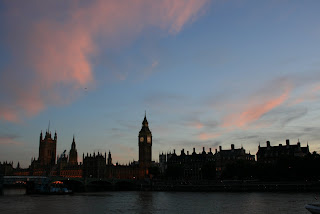
For me, inner peace is hard to define. It is not something I consciously seek, but like many things in life, in the most unexpected moments, it happens and then you understand what it is all about.
It is not that I am an unhappy or dissatisfied man but my restless mind is churning continuously. I ponder, analyze and worry. As parent, I am concerned about my children's' future, as a husband about my wife's happiness, as a son, about my aging parents' health and as a brother about my siblings' well being. I worry about my work and the state of the world. I feel like Atlas carrying the weight of the world on his shoulders. You couldn't tell that by looking at me but it is all there, clouding the recesses of my mind.
Last Sunday morning, I called my father in Beirut to wish him a happy 80th birthday. We exchanged a few words; he was never very good at connecting emotionally with his sons, but we could talk for hours about politics. As he thanked me for the call and bid me goodbye before putting my mother on, his voice broke a little; he was happy I called. My mother sounded relaxed and satisfied; she did not complain about her health. My youngest brother had visited from Morocco where he lives and returned the day before. She was happy to have spent time with him and satisfied that he was doing well.
When I put down the phone on that warm, late summer day, the clouds in the recesses of my mind cleared. All the people I cared about, those around me and those far away, were content and happy and consequently so was I. All other worries and concerns were irrelevant and temporarily purged from my mind. I felt light, relaxed and at peace for the rest of the day.
Who knew it could be so simple?
(Photo: A.K., Rainbow on a stormy cloud)


 From a tourist's point of view, London did not disappoint. What's not to like: a lively city choke full of history, people from everywhere, big pompous old buildings, castles galore and ridiculously attired guards performing anachronistic rituals. We stayed in the Kensington area, a couple of underground stops from the Marble Arch, my parents' rendezvous spot several decades ago. We roamed the city by foot and the Underground and occasionally by bus. Despite its size, London feels cozy with few steel-and-glass skyscrapers and numerous pedestrian friendly and lively neighborhoods. Given the sizes of the crowds we saw everywhere, the Glasgow incident and the rigged London cars did not seem to have dented the city's tourist appeal. In a week's time we crammed as many of London's attractions as we could.
From a tourist's point of view, London did not disappoint. What's not to like: a lively city choke full of history, people from everywhere, big pompous old buildings, castles galore and ridiculously attired guards performing anachronistic rituals. We stayed in the Kensington area, a couple of underground stops from the Marble Arch, my parents' rendezvous spot several decades ago. We roamed the city by foot and the Underground and occasionally by bus. Despite its size, London feels cozy with few steel-and-glass skyscrapers and numerous pedestrian friendly and lively neighborhoods. Given the sizes of the crowds we saw everywhere, the Glasgow incident and the rigged London cars did not seem to have dented the city's tourist appeal. In a week's time we crammed as many of London's attractions as we could.
 Windsor castle was one such place. I was astounded by the accumulated wealth contained within the walls of the castle, from the paintings to the arms lining the walls and the loot of war including Napoleon's Egyptian-made burnos. But more astounding was the fact that the castle and its contents were the property of the Royal family. I inquired with a friend in London about who pays for the upkeep of the castle. That set off my friend, a British republican, on a tirade about how the Royals live off the sweat of the people.
Windsor castle was one such place. I was astounded by the accumulated wealth contained within the walls of the castle, from the paintings to the arms lining the walls and the loot of war including Napoleon's Egyptian-made burnos. But more astounding was the fact that the castle and its contents were the property of the Royal family. I inquired with a friend in London about who pays for the upkeep of the castle. That set off my friend, a British republican, on a tirade about how the Royals live off the sweat of the people.